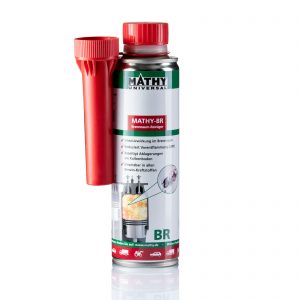Description
Cleaning we recommend the MATHY DPF cure to use!
To the MATHY DPF-KUR:
An expensive diesel particulate filter exchange/replacement is not necessary! Don't let your garage tell you "The diesel particulate filter is full, you need to buy a new one". For a new diesel particulate filter (DPF) you have to invest an average of 1,400 euros including installation.
A diesel particulate filter (DPF) only has a limited capacity to store soot particles. Above a certain amount of soot, these must be burned in a regeneration process to form CO2 and ash.
Can the soot in the DPF are not decomposed, this automatically results in the formation of ash.
The ash sets the particle filter (DPF) "closes", and the filter can no longer work and an expensive replacement or exchange of the particulate filter (DPF) is imminent in the workshop.
In vehicles that are mainly driven in short-distance operation (stop and go) for less than 20 km, the service life of the diesel particulate filter (DPF) considerably.
In short-distance operation, the diesel particulate filter (DPF) do not reach the necessary operating temperature for regeneration.
This is exactly where MATHY-DPF because the necessary burn-off temperature for the soot in the diesel particulate filter (DPF) is lowered so that the regeneration process can continue even at lower operating temperatures of the diesel particulate filter (DPF) can take place.
The service life of the particulate filter (DPF) is extended.
If your vehicle has the following characteristics, then it is usually already too late to prevent an expensive diesel particulate filter replacement:
- The engine indicator light in the dashboard is already illuminated
- The vehicle no longer has any power
- Emergency operation has already been initiated
- The vehicle has a high fuel consumption
With MATHY-DPF prevent an expensive diesel particulate filter exchange / replacement and the associated vehicle failure!
For vehicles with a mileage of less than 50,000 km, we recommend the regular application of MATHY-DPF.
For frequent short journeys (less than 20 km) it should be applied every 5,000 km; for "frequent drivers" at least every 10,000 km (1 can with 300 ml; sufficient for up to 50 liters of diesel fuel).
For vehicles with a mileage of over 50,000 km, we first recommend the MATHY-DPF cure www.mathy.de/dpf and then every 5,000 km for frequent short trips (less than 20 km); every 10,000 km at the latest for "frequent drivers".
Technical problems are reduced or eliminated:
- Prevents loss of power due to a clogged DPF
- Prevents increased fuel consumption due to a clogged DPF
- Prevents the exchange / replacement of the DPF before
- for all diesel engines with particulate filter
- Particularly recommended for vehicles that are mainly used in city traffic (stop and go)
- High efficiency with older vehicles or older particulate filters
- Compatible with AdBlue
Dosage:
The contents of the can MATHY-DPF (300 ml) is sufficient for up to 50 liters of diesel fuel.
Application:
Simply add the entire contents of the can (300 ml) to the almost empty tank before refueling and fill up with 50 liters of diesel.
Can be used in summer and winter diesel; suitable for modern common-rail (CDI) and pump-injector (TDI) engines.
It should be applied every 5,000 km for frequent short trips (less than 20 km) and at least every 10,000 km for "frequent drivers".
With a mileage of over 50,000 km, the first step is to carry out the MATHY-DPF cure through www.mathy.de/dpf.
In the second step, use the following for frequent short journeys MATHY-DPF every 5,000 km; for frequent drivers at least every 10,000 km.
Important note:
Diesel particulate filter (DPF) that are already completely filled with ash, the engine control light (yellow) is partially or permanently illuminated, the engine is running in the emergency running program, can be checked with MATHY-DPF can no longer be cleaned.
In these cases, the diesel particulate filter must be replaced or burned free by a specialist workshop. We recommend MATHY-DPF as a preventive measure!
The fuel quantity in the tank should be at least 10 liters.
Danger:
- H304: May be fatal if swallowed and enters airways.
- H412: Harmful to aquatic life with long lasting effects.
- EUH066: Repeated exposure may cause skin dryness or cracking.































